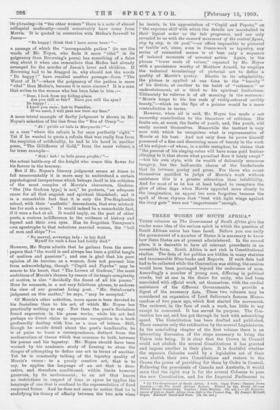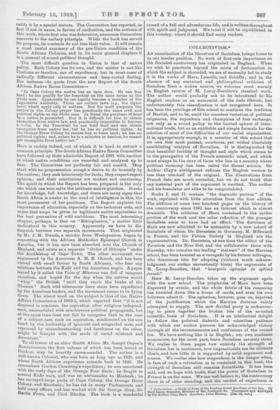THREE WORKS ON SOUTH AFRICA.*
THESE volumes on The Government of South Africa give the reader some idea of the serious spirit in which the question of South African union has been faced. Before you can unify the government of a number of States it is necessary to know how these States are at present administered. In the second place, it is desirable to have all relevant precedents in an accessible form. South Africa is not rich in Constitutional studies. The data of her politics are bidden in many statutes and innumerable Blue-books and Reports. If such data bad had to be collected while the Convention was sitting, the session would have been prolonged beyond the endurance of man. Accordingly a number of young men, differing in political creeds, but at one in the desire for unity, who had been associated with official work, set themselves, with the cordial assistance of the different Governments, to provide a digest of the necessary data. These two volumes may be considered an expansion of Lord Selborne's famous Memo- randum of two years ago, which first started the movement. The reviewer, in the face of such a work, has little to say except to commend. It has served its purpose. The Con- vention has sat, and has got through its task with astonishing speed. The Constitution has been drafted and published. There remains only the ratification by the several Legislatures. In the concluding chapter of the first volume there is an interesting discussion of the steps necessary to bring the Union into being. It is clear that the Crown in Council could not abolish the several Constitutions it has granted and impose another in their place. It is doubtful whether the separate Colonies could by a legislative act of their own abolish their own Constitutions and restore to the Crown the power of providing for them by Order in Council. Following the precedents of Canada and Australia, it would seem that the right way is for the several Colonies to pass the new Constitution, and for the Imperial Parliament to.
* (1) The Oovernntent of South Africa. 2 vole. Cape Town : Central News Agenoy.—(2) The South African Natives. Edited by the South African Native Races Committee. London : John Murray. Me. net.]—(3) Reminis- cences of Life in, South Africa from 1840 to the Present Day. By Joseph Malord, Orpou. Durbani: Davis and Sous, [2e. 6d. not.]
ratify it by a special statute. The Convention has reported, in fact if not in name, in favour of unification, and the authors of this work, whose first aim was federation, announce themselves converts to the unitary principle. While the book has served its purpose, its contents do not lose their value. It will remain a most useful summary of the pre-Union condition of the South African Colonies, and in its more general chapters it is a manual of sound political thought.
The most difficult question in Union is that of native policy. Each Colony has its own, and the matter is not like Customs or taxation, one of expediency, but in most cases of radically different circumstances and deep-rooted feeling. For instance—to quote from the new Report of the South African Native Races Committee-
" In Cape Colony the native has an open door. Re can buy land ; he can qualify for the franchise on the same terms as the white man. Apparently ho can legally become a member of the Legislative Assembly. There are certain laws (e.g., the liquor laws) which apply only to natives. But for most purposes the native in the Colony proper has practically the same civil and political rights as the white man, In Natal the purchase of land by a native is permitted. But it is difficult for him to obtain exemption from native law, and practically impossible to become a voter. In the Transvaal he can hold land and can obtain exemption from native law, but he has no political rights. In the Orange River Colony he cannot buy or lease land; he has no political rights ; and, unless he is a minister or teacher, he cannot get exemption from native law."
Here is variety indeed, out of which it is hard to extract a common principle. The South African Native Races Committee have followed up their admirable Report of 1901 with another in which native conditions are recorded and analysed up to date. The Committee are perfeotly fair and candid. They start with no prepossession except a desire to do honestly by the natives; they seek laboriously for facts; they respect expert opinion; and their conclusions are modest and convincing. The spirit in which the Report has been prepared is the only
one which can ever solve the intricate native question. It asks for knowledge, full knowledge, and there are many signs that South Africa is awake to the need of intelligence in this, the most permanent of her problems. The Report explains the importance of education, especially on the technical side, and urges that scope be given to legitimate native aspirations as the best preventive of wild ambitions. The most interesting chapter, perhaps, is that on "Ethiopianism," a matter little understood in this country. Apparently we have to dis-
tinguish between two separate movements. That originated by Mr. J. M. Dwarfs., a seceder from Wesleyanism, began by coquetting with the Afrioan Methodist Episcopal Church in America, but it has now been absorbed into the Church of
England, and exists as a separate " Order of Ethiopia" under the Archbishop of Cape Town. The other movement was engineered by the American A. M. E. Church, and has been 'viewed with small favour by South Africans, who fear any relations between the Kafir and the American negro. A paper issued by it called the Voice of Missions was full of rampant racialism, and hoped for the day when the natives would " whip " the British "until they reach the banks of the Thames." Such wild utterances have since been repudiated by the American leaders, and the movement seems to be dying down. The wisest word on the subject is that of the Native Affairs Commission of 1903.5, which reported that "it is not disposed to condemn the aspiration after religious independ- ence, unassociated with mischievous political propaganda, but at the same time does not fail to recognise that in the case
of a subject-race such an aspiration, misdirected on the one hand by the leadership of ignorant and misguided men, and repressed by misunderstanding and harshness on the other, might be fraught with the seeds of racial mistrust and discontent."
To all lovers of an elder South Africa Mr. Joseph Orpen'e Reminiscences, the first volume of which has been issued at Durban,may be heartily recommended. The author is a well-known Colonist, who was born as long ago as 1828, and whose South African experience extends back to 1846. He
remembers Gordon Curnming'e expedition ; he was associated with the early days of the Orange Free State ; he fought in several Kafir wars, and was an ambassador to Moshesh ; he has surveyed large parts of Cape Colony, the Orange River
Colony, and Rhodesia ; he has eat in many Parliaments and held many offices, and has worked with Sir George Grey, Sir Bartle Frere, and Cecil Rhodes. The book is a wonderful
record of a full and adventurous life, and is written throughout with spirit and judgment. We trust it will be republished in this country, where it should find many readers.










































 Previous page
Previous page